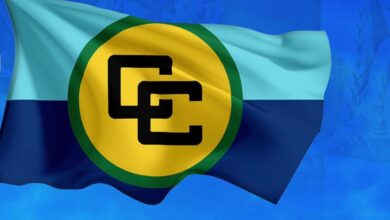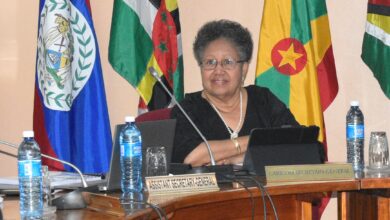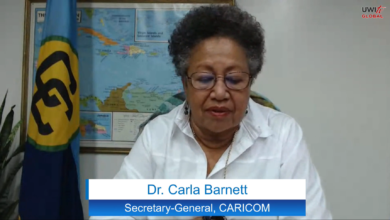Creole speaking Dominicans, as well as Haitians residing in that CARICOM Member State got their chance on Thursday February 27th, 2015, to learn about the CARICOM Single Market and Economy (CSME) and the five regimes which facilitate its operation as a single marketspace.
The platform was the very popular Creole radio interview and call-in show “Naftanoun” which airs weekdays on Dominica Broadcasting Service (DBS), and hosted by well-known media presenter and artist Felix Henderson.

Mr. Phillip McClauren, Deputy Programme Manager – CSME from the CARICOM Secretariat joined Henderson for the CSME-themed interview, to clarify the benefits of the CSME regimes for those whose first language is the French Creole (Kwéyòl) language that is widely spoken in Dominica and Saint Lucia. The 20 minute taped interview fielded in-depth questions on the benefits of the five regimes, consumer welfare in the CSME, Competition Law and Policy, the Online Company Registry, Single Jurisdiction,
Government Procurement and E-Commerce. It was further augmented by a 30-minute live telephone call-in component drawing on Dominica’s ambassador to CARICOM H.E Felix Gregoire and a CARICOM Consultant Barbara Jacobs-Small as resource persons.
A native of Saint Lucia, McClauren explained that due to the technical nature of many of the operational aspects of the CSME, it takes skill and proficiency to bring across some terms and fully explain what they mean without meaning being lost in translation.
“Creole is a language with its own orthography. One cannot simply translate word by word and make sense. It takes knowledge of the structure of the language and practice to find the creole equivalency of words or phrases that explain just what they mean. That is important because the CSME is about people moving, working, doing business and looking to better themselves in a wider market space,” The CARICOM Official said.
Haiti is also a creole speaking CARICOM Member State. McClauren says while there are differences, there are also with sufficient similarities in the syntax of Haitian and Dominican Kwéyòl to effectively engage with Haitian stakeholders in Dominica.
Questions raised by DBS listeners sought clarification on a range of issues, among them – the collection of social security upon retirement for CARICOM nationals who have worked in more than one Member State; rights relative to the movement of agricultural goods; treatment at the border; the Shanique Myrie Judgement and the importance of knowing your rights within the CSME, and also steps involved in establishing a business in another Member State.
The CARICOM delegation was in Dominica to provide training on the operations of the CSME for Media and for representatives of private and public sector agencies. The training sought to build the capacity to raise awareness, and increase the participation of Dominicans in the CSME.
The training fell under component 300 of the CARICOM Trade and Competitiveness Project (CTCP) which seeks to widen the scope of participation by stakeholders and beneficiaries in the process of decision-making, implementation and operation of the CARICOM Single Market. It is an activity under the Improving Information Flows Project within the CSME being spearheaded by the CARICOM Secretariat with funding from the Canadian Government and local coordination by Dominica’s CSME focal point, the Ministry of Trade, Energy and Employment.






